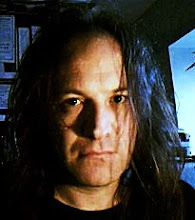item #0660
The Ryder story is nice! (I never liked the Mondays. But the band I was in at the time ... several of those were fans. So I'm familiar with them.) Intentions/intentionality ... interesting stuff, so mysterious. Hard enough attempting to work out the intent of others, when we may not even be so sure of our own motivations. Yet, analyses of most anything turn upon the supposed usefulness and appropriateness of such things. I'm sure you're familiar with the concept of 'The Intentionalist Fallacy'. The way most inquiry into art is conducted relies upon attempting to locate intentions, put through a pop admix of Freud & Existentialism, sometimes economics/materialism - offered as a system by which to judge things. Ryder just didn't play the game the interviewer wanted him to; we might think he was playing his own game; we might think he was intentionally being iconoclastic, his own man. But it may well be simply that Ryder was too drugged-up. An essay I like is 'Art History, Art Criticism and Explanation', Michael Baldwin et al, in (ed.) Francis Frascina, Pollock and After: The Critical Debate, pp. 191-216. Baldwin et al function as the art-group, Art & Language - who, under different line-ups of personnel, has contributed to Conceptual Art from the earliest times. Charles Harrison is amongst the group. He's a lecturer at The Open University. Great writer. The essay itself deals with your 'problem' in terms of problems associated with anthropology, but which have general application, and specific application when one is given the tasks of explaining works of art. I'd say works of art are only utterances; so the same is true of any utterance, any communicative act. How it lands in our brain from the brain of another is, of course, the question. Anthropology has various techniques for inquiry; but these fall into either (a) going native or (b) remaining outside, looking in. The essay deals with the so-called 'Trobriand Island Problem'. Roughly speaking, this is the problem of an inquirer joining the group to be researched - going native. This impacts upon such things as eyewitness-accounts, first-hand experience. Massive problems with the veracity of both, as I'm sure you know. Still, such primary knowledge reigns supreme in our society. In a sense, Ryder was being asked for his primary knowledge about himself. He might, though, be the last to know! The other thing is his silence was no doubt used by those wanting to paint him as a radical. The truth, though, might be very different. The essay deals with this in a revealing way.


0 Comments:
Post a Comment
<< Home